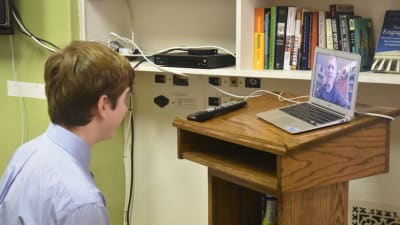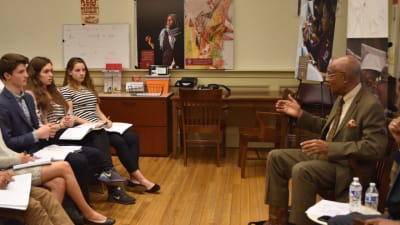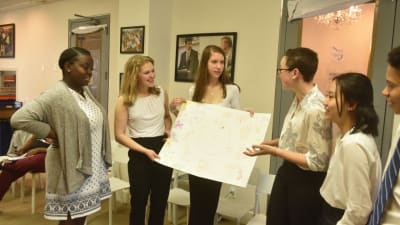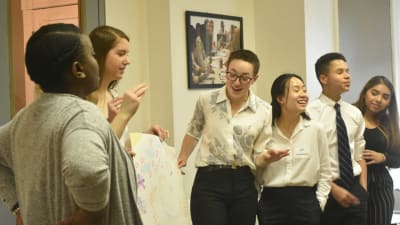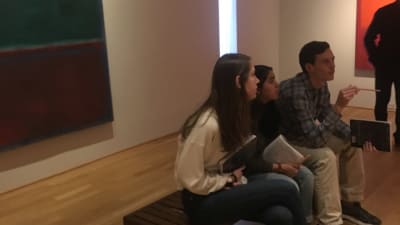Spring 2019 and Ghosts of Rwanda Night
Ghosts of Rwanda Night is a well-remembered SEGL rite-of-passage. Since our first semester, the powerful PBS Frontline documentary has challenged our students with classic leadership dilemmas: What is the most ethical response to mass atrocities? Should American leaders always prize American interests above all? Is it ever worth risking American lives to help halt tragedy abroad? How do we prevent human rights abuses from ever occurring? Ghosts, and our second case study of the semester, raises these questions.
Ghosts of Rwanda Night happened last Saturday. Students gathered in our West dormitory to watch and discuss the documentary together. The discussion was reflective and emotional. Many students continued their conversations in dorm rooms after hours, and reflected on the film’s questions in weekly English journal entries.
Three of the leaders featured in the documentary are longtime SEGL guest speakers, and we plan to meet with two of them.
Carl Wilkens is a former Adventist missionary who was the head of his church’s relief mission in Rwanda during the genocide. He was the only American to stay behind in 1994, and is most well-known for (among other acts) saving an entire orphanage from Interahamwe machetes. To SEGL graduates, he is a winner of our coveted “Golden Mug” award, which our graduates give to the speaker who has made the biggest difference in their lives. (Carl is also an honorary SEGL teacher; twice he has co-led a group of our students to Rwanda. To learn more about our 2018 trip–our third journey to the Land of 1000 Hills–visit our SEGL in Rwanda page.)
Wilkens videoconferenced from his Washington State home (he hopes to visit DC later this semester). He is the founder of World Outside My Shoes, a genocide prevention NGO that travels the country speaking to schools, universities, and others. The students asked him a wide range of questions–some personal, some political–and listened intently as he carefully and thoroughly addressed each one.
On Wednesday, we took a step back from Rwanda and examined U.S. foreign policy today. What are the Trump Administration’s principle goals, and how will the Administration interact with Congress to achieve them? How might answers to those questions shed light on key questions from Ghosts of Rwanda? Students heard from U.S. Senator Ted Cruz on these topics at the American Enterprise Institute, a leading conservative think tank one block from our Academic building. (They also heard a fascinating and lengthy back-and-forth between Senator Cruz and a Gold Star father during the Q and A period.)
Later that afternoon, the students took part in a favorite SEGL activity–the Leadership Styles exercise. With two questions (“Is your first instinct to observe or speak when in a group making a decision?” “When you make important decisions, do you decide with your head or your heart?”) the students divided themselves up into four classic leadership styles: Driver, Expressive, Analyst, and Supportive. Each group completed the same given task, but ended up with very different results; the ensuing conversation revealed, among other insights, the importance of having each style reflected in any decision making group (or, perhaps, in any decision making leader!).
Later this week, we will continue our Rwanda case study with a trip to the Rwandan Embassy and met with lead officials there who shared information about Rwanda’s reconciliation attempts, the nation’s current challenges, and the officials’ personal stories. If we are lucky, Mathilde Mukantabana, the Rwandan Ambassador to the U.S., will stop by for a few words.
Then, on Monday, we will hear from Ambassador George Moose, who was Assistant Secretary of State for African Affairs during the genocide. Moose (another Golden Mug honoree) will help students appreciate the bureaucratic decision making hurdles that stymied attempts to intervene, as well as the legitimate reasons governments might not want to intervene in such conflicts. We will round out this case study with a Saturday Academy visit to the U.S. Holocaust Memorial Museum.
(The third longtime SEGL guest speaker featured in the film is current UPS Vice President for Global Affairs Laura Lane. Although Lane no longer speaks publicly about her time in Rwanda, she gave a TED talk in 2015 that is very similar to the story she has told countless SEGL graduates. You can view that talk here.)
Last week students also participated in the first edition of our Books and Basketball community service project (more on that in a future post), their first student-led School Meeting, and watched President Trump’s State of the Union (which he gave just a block from our Capitol Hill residence). We’ve also included a few photos from our first week’s trip to the Phillips Collection (where they compared Jacob Lawrence’s landmark Migration Series with other works from the collection).
Next up: the Israeli-Palestinian Conflict.





